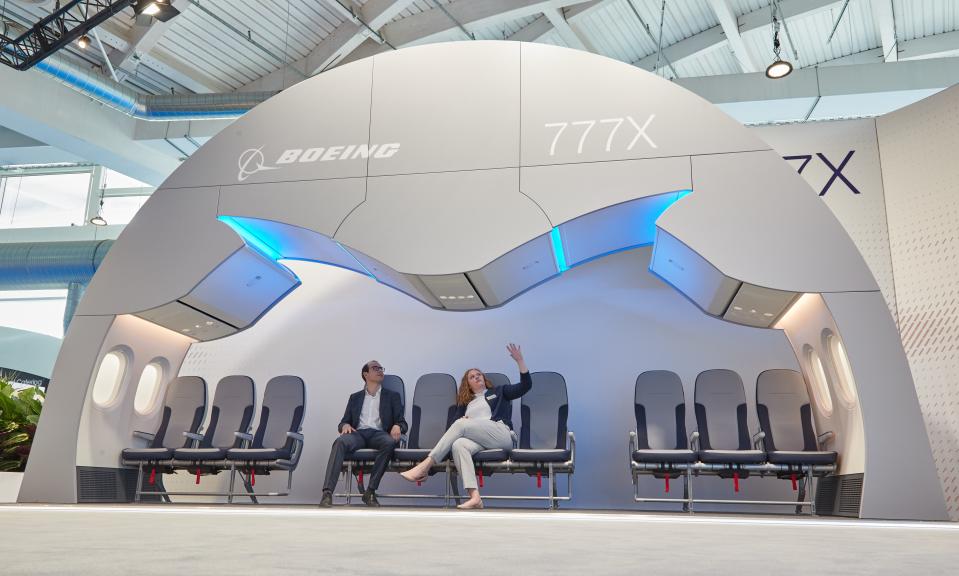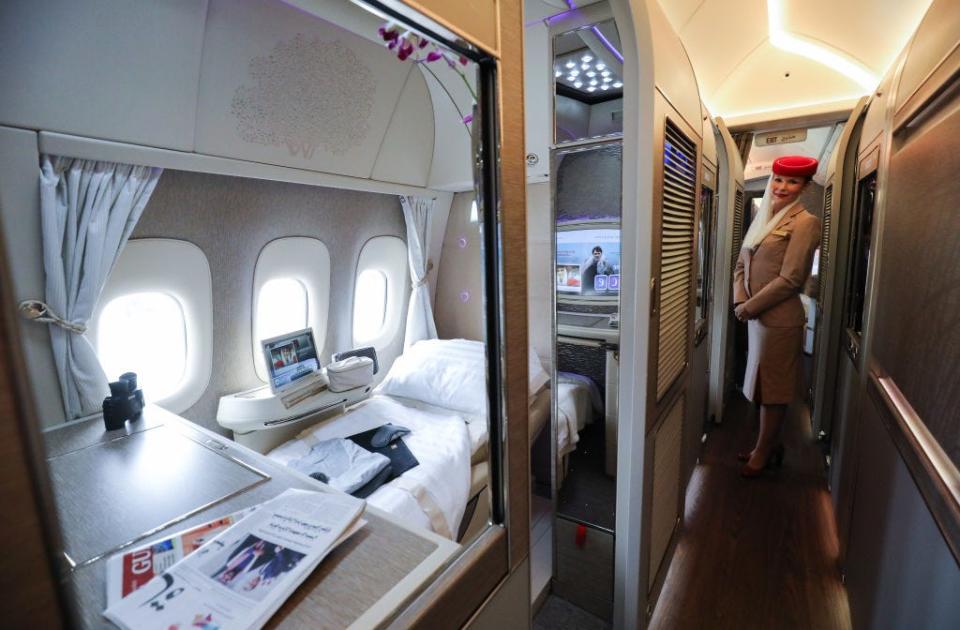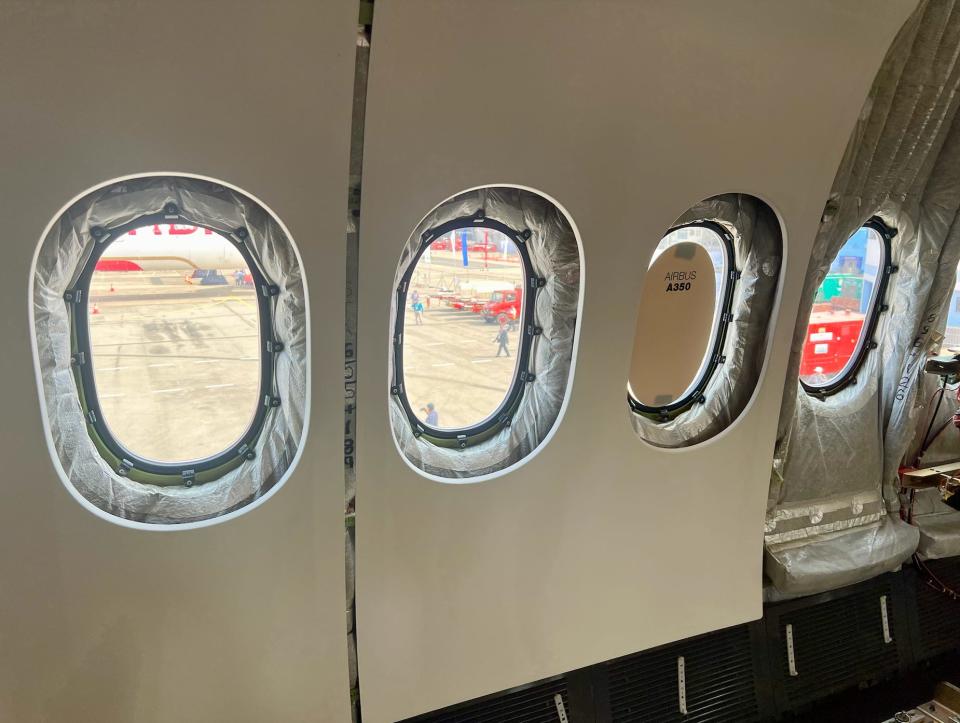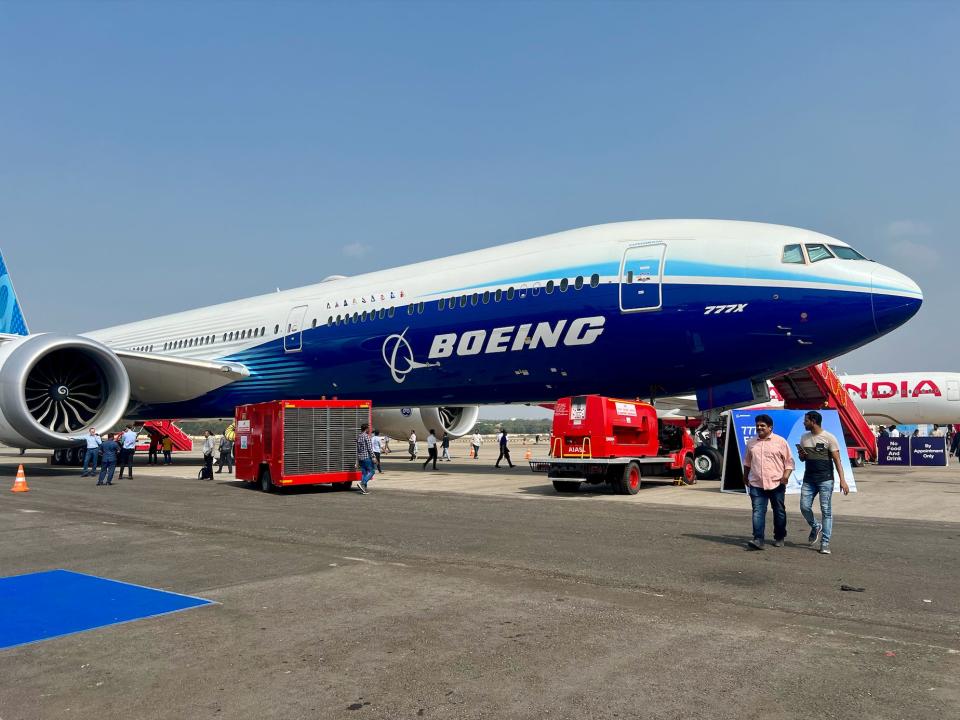-
After years of delays, Boeing’s upcoming 777X began certification flight testing in mid-July.
-
The design boasts a suite of cabin comforts, like bigger windows and reduced feelings of turbulence.
-
Airlines can customize the mood lighting with specific colors and scenes, like the northern lights.
Boeing may be entangled in its 737 Max fiasco, but it’s earning some wins with its upcoming new flagship widebody, the 777X.
The aircraft, which is based on the classic 777 and will come in two passenger variants started certification flight testing in mid-July.
It is the next step in clearing Boeing’s new plane for passenger flights after nearly five years of delays and more than $1 billion in abnormal expenses.
“The certification flight testing will continue validating the airplane’s safety, reliability, and performance,” a Boeing spokesperson told Business Insider. “We appreciate our regulator’s rigorous oversight.”
Boeing expects the plane to enter service in 2025, but two major customers have said they expect more delays, possibly to 2026.
The delays have caused problems for aircraft operators because they’re still flying older, less efficient planes as they wait for the 777X.
Airlines are eager to replace aging, old-generation widebodies. The 777X, which competes with the rival Airbus A350, boasts an increased range, capacity, and efficiency compared to its predecessors.
The jet’s immense size — particularly its wider frame — is one of its best-selling characteristics gives operators some wiggle room regarding the cabin layout.
In July, Boeing showed what passengers can expect onboard, from bigger windows and cabins to mood lighting that resembles the northern lights.
Like its predecessor, the 777X can accommodate up to 10 seats per row in economy.

Airlines favor the 777-9 for its huge capacity. The aircraft — which is the largest twin-engine commercial jetliner in production — can carry up to 426 people in two cabins, including 10 abreast rows in the economy section.
This isn’t new to the 777, as previous models offer the same feature. The A350’s build was modified in late 2022 to also offer 10-abreast seats.
However, the 777X’s larger cabin, which is four inches wider than the 777-300ER the plane is derived from, means those seats can offer more width than its predecessors and its competition.
The economy cabin mockup on display featured 18-inch seats, but airlines can customize how they configure the plane.


The 18-inch wide seats improve on the 17.2 inches of seat width previously achievable, Boeing’s regional director of cabin marketing, Stephanie Werner, told media at the airshow.
The 777X also offers more seat width than the up-to-17-inch seats Airbus can offer on its 10-abreast A350.
Werner said the wider 10-abreast seats are simply an option for operators and that the giant plane can accommodate all sorts of different cabin designs.
“Airlines have total flexibility and choice in how to configure the planes, so they can do anything in between,” she said. “So if they want to get more aisle width or seat width, that’s up to them.”
Coach can include regular and premium economy. Up front, airlines can install their unique business and first-class seats.


Qatar, for example, has said its future 777X planes will have a new first-class cabin, though details are still limited.
Cathay Pacific Airways is also plans to install a new first-class on its 777Xs that will be unique to the plane. Further, the airline is expected to equip the jets with the upgraded premium economy and business class seats it is actively adding to its 777-300ER fleet.
Competitor Emirates, for its part, plans to install its new “Game Changer” first-class on its 777X fleet. The cabin, which has a floor-to-ceiling door and “virtual windows” in the center seats that mirror outside the plane, is already flying on Emirates’ 777-300ERs.
Beyond seating, the 777X’s design flexibility also includes two ceiling options for operators.


Werner said the 777X has two ceiling options. These can exist on the same plane but differ in curvature to give operators “architectural flexibility.”
The “A” option removes the overhead bins in the center section to give the cabin more height. She said this would be good for premium cabins where less bag storage is needed, and seat space is coveted.
The “B” option flips that 180 degrees to create a downward arch with overhead bins, which Werner said is likely preferred in coach but creates a greater sense of width.
The ceiling complements the 777X’s interior lines with curves that Boeing has added to create more sense of spaciousness.


During the cabin mockup presentation, Werner pointed to the entry arch that opens the cabin.
“We do that intentionally so that passengers, as they enter the space, can begin to mentally reset and reframe and start to relax a little bit as they get to their seats,” she said.
Boeing has created bigger windows that are higher on the fuselage.


BI has toured the experimental 777X at several airshows, and Boeing has always added a side-by-side comparison with the A350 windows. It shows the higher placement and the 29% bigger size difference.
Werner said the goal of the 777X giant windows is to make the cabin feel bigger and give every passenger a better view.
“Whether you’re seated at a window seat or seated in the center of economy, your line of sight will see the sky from your seat,” she said.
Further, the windows can be dimmable.


Boeing has taken its 787 Dreamliner’s staple dimmable windows and made them an option on the 777X, meaning airlines must order their planes with the feature.
According to the mockup at the airshow, instead of a button like on the 787, the 777X dimmer is activated via a switch above the window. This will reduce the chance of inadvertently hitting the button with an arm or elbow.
“This is something that gives passengers more autonomy on how much light they want,” Werner said.
Travelers shouldn’t have an issue finding overhead bin space, even if they’re last to board.


Werner said the 777X could accommodate up to four bags in each overhead bin, which has been designed with a sleek curve to make them feel less bulky above passenger seats.
“If anyone has ever had anxiety before, hoping you don’t have to gate check your bag, this can help relieve some that bin anxiety,” she said.
Werner further explained that the bins’ closing force has been reduced by 40% to make things easier for passengers and crew.
Considering the 777X will be a long-haul workhorse, mood lighting was a point of focus.


Mood lighting has several purposes, like calming travelers and battling jet lag. The 777X offers new color hues and scenes to amplify that effect, which Werner said 777X customers can individually customize.
“Instead of having the pressure on the cabin crew to select the custom lighting scenes, we want to make it easier for them overall to select ones that are predetermined by the airline brand,” she said, noting an airline ferrying a World Cup team could display the team’s colors, for example.
We saw several different scenes, including a starry night sky, a sunset, and the northern lights.


She wanted to demonstrate how airlines can choose lighting schemes that change over the course of the flight, from boarding to meal service to sleep.
“It gives a little bit more comfort for passengers as you have this dynamic lighting that instead of switching from one light to another,” she said. “We want them to have a gradual change of light.”
Several passenger enhancements on the 777X are not visible to the human eye, like minimizing noise and the feeling of turbulence.


Improvements include better cabin humidity and altitude, the latter at 6,000 feet on the 777X. Werner said these conditions are better on the body and help passengers feel refreshed when they land.
Thanks to the plane’s enhanced engines and aerodynamics, there’s also less noise onboard. Further, Werner said passengers will feel less turbulence due to the jet’s “lateral and vertical gust suppression.”
“When there is more turbulence, which we are seeing more of these days, and passengers are white-knuckling in their seat because they’re nervous, the [system] can smooth it out,” she said.
Read the original article on Business Insider
Source Agencies
